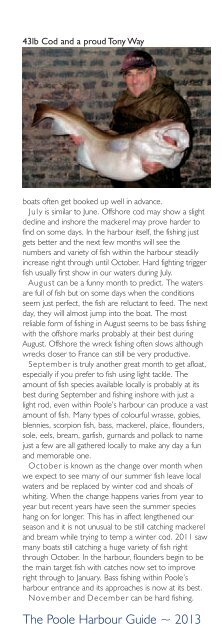Create successful ePaper yourself
Turn your PDF publications into a flip-book with our unique Google optimized e-Paper software.
43lb Cod and a proud Tony Way<br />
boats often get booked up well in advance.<br />
July is similar to June. Offshore cod may show a slight<br />
decline and inshore the mackerel may prove harder to<br />
find on some days. In the harbour itself, the fishing just<br />
gets better and the next few months will see the<br />
numbers and variety of fish within the harbour steadily<br />
increase right through until October. Hard fighting trigger<br />
fish usually first show in our waters during July.<br />
August can be a funny month to predict. <strong>The</strong> waters<br />
are full of fish but on some days when the conditions<br />
seem just perfect, the fish are reluctant to feed. <strong>The</strong> next<br />
day, they will almost jump into the boat. <strong>The</strong> most<br />
reliable form of fishing in August seems to be bass fishing<br />
with the offshore marks probably at their best during<br />
August. Offshore the wreck fishing often slows although<br />
wrecks closer to France can still be very productive.<br />
September is truly another great month to get afloat,<br />
especially if you prefer to fish using light tackle. <strong>The</strong><br />
amount of fish species available locally is probably at its<br />
best during September and fishing inshore with just a<br />
light rod, even within <strong>Poole</strong>’s harbour can produce a vast<br />
amount of fish. Many types of colourful wrasse, gobies,<br />
blennies, scorpion fish, bass, mackerel, plaice, flounders,<br />
sole, eels, bream, garfish, gurnards and pollack to name<br />
just a few are all gathered locally to make any day a fun<br />
and memorable one.<br />
October is known as the change over month when<br />
we expect to see many of our summer fish leave local<br />
waters and be replaced by winter cod and shoals of<br />
whiting. When the change happens varies from year to<br />
year but recent years have seen the summer species<br />
hang on for longer. This has in affect lengthened our<br />
season and it is not unusual to be still catching mackerel<br />
and bream while trying to temp a winter cod. 2011 saw<br />
many boats still catching a huge variety of fish right<br />
through October. In the harbour, flounders begin to be<br />
the main target fish with catches now set to improve<br />
right through to January. Bass fishing within <strong>Poole</strong>’s<br />
harbour entrance and its approaches is now at its best.<br />
November and December can be hard fishing.<br />
<strong>The</strong> <strong>Poole</strong> <strong>Harbour</strong> <strong>Guide</strong> ~ <strong>2013</strong><br />
<strong>The</strong> weather is often challenging and anglers must be<br />
equipped and prepared for the cold temperatures and<br />
sometimes fresh winds. Putting up with the harsh winter<br />
conditions does bring its rewards though. Large winter<br />
cod are most anglers target out in <strong>Poole</strong> Bay with fish<br />
over 20lb quite common. Larger fish are also reported<br />
and several in excess of 30lb are caught each year. <strong>The</strong><br />
biggest on record was a massive 43lb and half an once<br />
caught by local angler Tony Way in 2002. Whiting can<br />
be prolific with vast shoals of these sweet tasting fish<br />
occupying local waters from October through to<br />
January. Winter fishing in recent times doesn’t just mean<br />
sitting it out for that big cod. Congers are common<br />
inshore during the winter, as are rays and even the<br />
occasional big bass.<br />
Angling vessels are not allowed<br />
to drift in the fairways, or to<br />
obstruct other vessels with their<br />
craft or gear in any channel or<br />
fairway (Byelaw 2c and 2d)<br />
<strong>Poole</strong> & District<br />
Fishermen’s<br />
Association<br />
<strong>The</strong>re has been evidence of fishermen in <strong>Poole</strong> since<br />
Roman times hence the old oyster bank, which used to<br />
exist at the end of Little Channel, now buried under the<br />
<strong>Poole</strong> Quay Boat Haven marina.<br />
<strong>The</strong> <strong>Poole</strong> and District Fishermen’s Association was<br />
founded just after the 1914 – 18 war. Most of the boats<br />
which fished <strong>Poole</strong> Bay were beached in the dunes at<br />
Sandbanks. At that time all the trawlers were sailing<br />
vessels working at the mercy of the wind and the tide.<br />
Now, since the 1940’s, with powerful engines they can<br />
operate almost anywhere at all times, hence the decline<br />
of fish stocks. Few trawlers operate out of <strong>Poole</strong> these<br />
days having been replaced by crab and lobster potters<br />
and set nets which in season catch sole, bass, plaice,<br />
skate etc., and in the summer <strong>Poole</strong> Canoes ring net for<br />
bass and mullet. Winter sprats are no longer caught, as<br />
there is no market for them. Shellfish, cockles and clams<br />
are dredged at certain times of the year. Other shellfish<br />
are farmed in the harbour. Twenty-acre plots are<br />
licensed and the beds sown with immature mussels and


